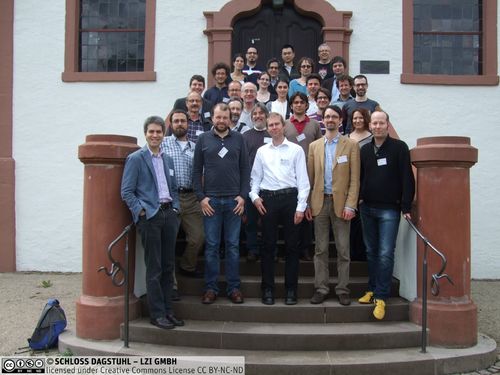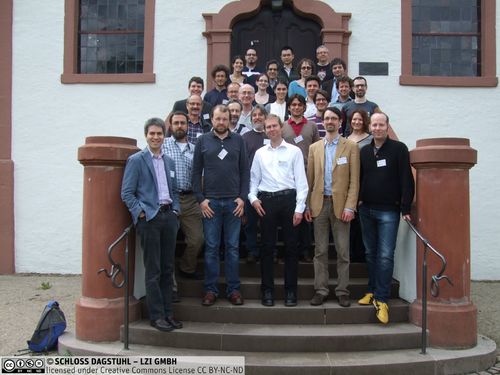Dagstuhl Seminar 14202
JA4AI – Judgment Aggregation for Artificial Intelligence
( May 12 – May 15, 2014 )
Permalink
Organizers
- Franz Dietrich (CNRS, FR & University of East Anglia, GB)
- Ulle Endriss (University of Amsterdam, NL)
- Davide Grossi (University of Liverpool, GB)
- Gabriella Pigozzi (University Paris-Dauphine, FR)
Coordinator
- Marija Slavkovik (University of Bergen, NO)
Contact
- Andreas Dolzmann (for scientific matters)
- Annette Beyer (for administrative matters)
Impacts
- Respect for experts or respect for unanimity? : The liberal paradox in probabilistic opinion pooling / Frederik S. Herzberg. - Bielefeld : Universität, 2014. - 6 pp. - (Center for Mathematical Economics Working Papers ; 513) - Herzberg, Frederik - Bielefeld : Universität , 2014. - 6 pp. - (Center for Mathematical Economics Working Papers ; 513).
- Respect for experts vs. respect for unanimity : The liberal paradox in probabilistic opinion pooling : article in "Economics Letters" : pp. 44-47 - Herzberg, Frederik S. - Amsterdam : Elsevier, 2017 - (Economics Letters ; 151. 2017, pp. 44-47).
Schedule
Judgment aggregation (JA) is the study of methods for amalgamating the views of several agents regarding the truth of a set of interrelated propositions. Originating in the humanities and the social sciences, particularly philosophy and economics, in recent years JA has started to also attract interest from computer scientists. The aim of this Dagstuhl Seminar is to give researchers across the contributing disciplines an integrated perspective on current research and emerging trends in JA, and to facilitate lasting collaboration across disciplinary boundaries.
JA was established as an independent research area in the early 2000's. In other areas of social choice, such as voting, preference aggregation, or fair division, research started with the proposal of concrete practical methods, and only later these methods have been analyzed using sophisticated theoretical frameworks, such as the axiomatic method. In JA research evolved in the opposite direction. The first half of the decade was marked by axiomatic studies, dominated by impossibility results and comparisons with the theory of preference aggregation. This work was largely conducted by researchers in the humanities and the social sciences. Due, amongst other things, to the potential for applications of JA in multi-agent systems and the parallels between concerns in JA and questions studied for some time in knowledge representation and reasoning, the second half of the decade witnessed an increase of interest in JA from researchers in computer science, and specifically in artificial intelligence (AI).
In AI, research on JA has since diversified significantly, with scholars pursuing a wide variety of different lines of research: JA and logic, JA and complexity theory, JA and belief merging, JA and argumentation theory, to mention a few. However, the awareness of these new directions amongst JA researchers outside of computer science is still very limited. At the same time, work in JA has continued in the humanities and the social sciences, also along many different lines of research: e.g., JA and deliberation, JA and strategic voting, JA and probabilistic opinion pooling. Many of those most recent results have not yet reached the AI community.
JA researchers from computer science and those from other fields each publish within their own discipline with virtually no cross-discipline cooperation on concrete projects. We believe that this is the right moment to pull together all these lines of research in JA, so as to enable cross-disciplinary cooperation and to chart the main research challenges for the coming years.
The seminar will feature both classical conference-style talks and a "rump session", a session of very short talks in which participants can quickly introduce a new research topic, a new idea, or a specific open problem. Most importantly, the seminar will provide plenty of space for discussion and collaboration.
Judgment aggregation is a group decision-making theory, developed in the last decade, that studies how to reach group decisions on logically interconnected issues by aggregation of individual decisions on those issues. The interest of computer science in group reasoning and decision-making theories is driven by the increase of distribution of information and computation as features of various Internet-based services that dominate the information technology market.
Judgment aggregation studies collective decision-making as a process whereby individual opinions concerning the acceptance or rejection of a set of issues are aggregated into one collective judgment. The problem is for the aggregation process to preserve, in a non-trivial way, some 'rational' aspects of the individual to-be-aggregated stances like, in particular, logical consistency. A wealth of results have highlighted how the rationality of a collective decision may clash with other desirable properties of a process of aggregation one may wish to require (e.g., anonymity of the voters, independence of the aggregated issues, to mention a few).
Judgment aggregation research, originally studied in law, was propelled into other disciplines with its establishment as a separate discipline from preference aggregation in the early 2000's. The first half of the decade was marked by studies of aggregation properties that cannot be jointly satisfied by one aggregation function, usually referred to as `impossibility results'. These studies were mostly conducted by researchers from political science, law, economics, mathematics, and philosophy. The second half of the decade witnessed an increase of interest in judgment aggregation of researchers from artificial intelligence (AI), specifically knowledge representation and reasoning (KR), and multi-agent systems (MAS).
Research on judgment aggregation, from the computer scientific perspective, has splintered in many directions, with scholars pursuing very different lines of research: judgment aggregation and logic, judgment aggregation and complexity theory, judgment aggregation and relations to preference aggregation, judgment aggregation and belief merging, judgment aggregation and argumentation, to mention a few. At the same time work in judgment aggregation has diversified in non-computer science disciplines: judgment aggregation and deliberation, judgment aggregation and strategic voting, judgment aggregation and probabilistic opinion pooling, to mention a few. Despite the common research thread, having so many disciplines involved make it difficult to keep track of the research advancements across all domains.
The goal of this Dagstuhl seminar was to give researchers across the contributing disciplines an integrated overview of the current research and interests in judgment aggregation and of its emerging trends, and by doing this, to kick-start a lasting interdisciplinary network bridging the computer science/humanities divide in the field. To accomplish this goal, we structured the seminar around four types of events:
- Invited tutorials - three invited overview talks aimed to introduce the interdisciplinary audience to the origins and advancements of judgment aggregation in law, political science and computer science.
- Contributed talks - fourteen contributed talks of thirty minutes each.
- Networking sessions -- two free networking sessions.
- Rump session -- open to all participants to present new ideas.
The topics of the invited talks were chosen so as to give a foundation of the disciplines in which judgment aggregation originated and was formalised, as well as to motivate the interest of judgment aggregation for computer science. Although we expected that all of the participants would be familiar with at least one of these foundational topics, we also expected them to be unfamiliar with at least one as well. The tutorial lectures aimed to homogenise the background knowledge in judgment aggregation among the participants.
The contributed talks aimed to introduce the community with the recent work of the speakers. We accommodated fourteen talks, possibly compromising on the length of the talk itself in the interest of allowing space for questions. We are happy to observe that there was a lively debate after each of the talks, which we expect shall contribute towards advancement of each of the presented works.
Given the short period of three days and prior Dagstuhl experience of the organisers, we decided to not structure the networking session and simply allow for a time for the participants to talk to each other and get to know about each other's work and interests. The enthusiastic discussions following the contributed talks typically continued into the networking sessions.
The rump session was free for a last-minute sign up to all participants. Each interested person was given a five-minute time slot to present an idea that emerged during the seminar or a work in progress. A third of the participants took this opportunity to present. This was a very lively and well received part of the seminar. In retrospect, a similar session would have been well received also at the beginning of the seminar, giving the participants more time to discuss the presented ideas.
 Franz Dietrich and Ulle Endriss and Davide Grossi and Gabriella Pigozzi and Marija Slavkovik
Franz Dietrich and Ulle Endriss and Davide Grossi and Gabriella Pigozzi and Marija Slavkovik
- Edmond Awad (Masdar Institute - Abu Dhabi, AE) [dblp]
- Dorothea Baumeister (Heinrich-Heine-Universität Düsseldorf, DE) [dblp]
- Veronica Block (KIT - Karlsruher Institut für Technologie, DE)
- Franz Dietrich (CNRS, FR & University of East Anglia, GB) [dblp]
- Ulle Endriss (University of Amsterdam, NL) [dblp]
- Umberto Grandi (University of Padova, IT) [dblp]
- Davide Grossi (University of Liverpool, GB) [dblp]
- Paul Harrenstein (University of Oxford, GB) [dblp]
- Frederik S. Herzberg (Universität Bielefeld, DE) [dblp]
- Ron Holzman (Technion - Haifa, IL) [dblp]
- Christian Klamler (Universität Graz, AT) [dblp]
- Sebastien Konieczny (CNRS - Lens, FR) [dblp]
- Lewis A. Kornhauser (New York University, US) [dblp]
- Jérôme Lang (University Paris-Dauphine, FR) [dblp]
- Yixi Li (Sun Yat-sen University - Guangzhou, CN) [dblp]
- Christian List (London School of Economics, GB) [dblp]
- Xavier Mora (Autonomus University of Barcelona, ES) [dblp]
- Ilan Nehama (Hebrew University - Jerusalem, IL) [dblp]
- Klaus Nehring (University of California - Davis, US) [dblp]
- Nicolas Paget (University Paris-Dauphine, FR)
- Gabriella Pigozzi (University Paris-Dauphine, FR) [dblp]
- Ramon Pino-Pérez (Univ. de Los Andes - Merida, VE) [dblp]
- Marcus Pivato (Trent University, CA) [dblp]
- Daniele Porello (National Research Council - Povo (Trento), IT) [dblp]
- Clemens Puppe (KIT - Karlsruher Institut für Technologie, DE) [dblp]
- Marija Slavkovik (University of Bergen, NO) [dblp]
- Paolo Turrini (Imperial College London, GB) [dblp]
- Leon van der Torre (University of Luxembourg, LU) [dblp]
- William S. Zwicker (Union College - Schenectady, US) [dblp]
Classification
- artificial intelligence / robotics
- semantics / formal methods
- verification / logic
Keywords
- Judgment aggregation
- collective decision-making
- belief merging
- multi-agent systems
- logic



 Creative Commons BY 3.0 Unported license
Creative Commons BY 3.0 Unported license
